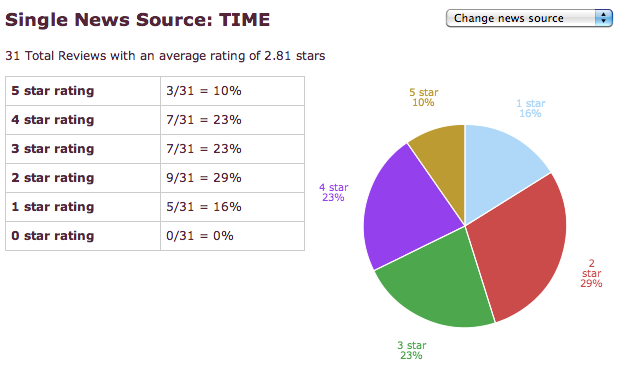How do you turn a flood of news and information into something useful? That’s what we try to do at Delve, and for our Wonk Lens series we ask smart people how they manage it.
- Gary Schwitzer has spent nearly 40 years reporting on health in radio, television, interactive multimedia and the Internet. Most recently he started HealthNewsReview.org, which has drawn praise from journalists, doctors, politicians, and patients. As the editors of the journal PLoS Medicine wrote: “Schwitzer’s alarming report card of the trouble with medical news stories is … a wake-up call for all of us involved in disseminating health research-researchers, academic institutions, journal editors, reporters, and media organizations-to work collaboratively to improve the standards of health reporting.” He has also worked as an associate professor at University of Minnesota School of Journalism & Mass Communication, and spent a year serving as an Ethics Fellow at The Poynter Institute.
- Can you give me the elevator pitch for HealthNewsReview.org – what are you trying to do?
- We are in a strange era where a lot of the news people accept as truth isn’t filtered for quality. There’s a democratic factchecking that happens on the Internet, and then there are a few credentialed sources like HealthNewsReview.org and FactCheck.org, but traditional journalistic rigor just hasn’t kept up with the Internet. Do you think organizations like yours are up to the task?
- And how are you working on that?
- Where’s the right place to place the focus and the pressure here? On the individual reporter? On the news organization?
- Everyone has a few guilty pleasures, what are yours?
- Well, it’s an impressive example of what can be done.

How do you turn a flood of news and information into something useful? That’s what we try to do at Delve, and for our Wonk Lens series we ask smart people how they manage it.

Gary Schwitzer has spent nearly 40 years reporting on health in radio, television, interactive multimedia and the Internet. Most recently he started HealthNewsReview.org, which has drawn praise from journalists, doctors, politicians, and patients. As the editors of the journal PLoS Medicine wrote: “Schwitzer’s alarming report card of the trouble with medical news stories is … a wake-up call for all of us involved in disseminating health research-researchers, academic institutions, journal editors, reporters, and media organizations-to work collaboratively to improve the standards of health reporting.” He has also worked as an associate professor at University of Minnesota School of Journalism & Mass Communication, and spent a year serving as an Ethics Fellow at The Poynter Institute.
Can you give me the elevator pitch for HealthNewsReview.org – what are you trying to do?
The project began by focusing on the quality of health care journalism in major mainstream news organizations. Those systematic story reviews continue. But increasingly, through our blog, the site addresses other forms of media messages that flood the American public daily – including advertising, marketing and public relations messages. In all, we’ve now published nearly 3,500 pieces on some form of health care journalism or communication. We try to improve journalism because of the influence it may have on consumers. But we also try to reach consumers directly by showing them how to critically evaluate claims about health care interventions. The civic education of the American public on health care issues suffers as a result of the daily drumbeat of imbalanced messages. Communication itself has become a major health policy issue. We think we can be, and already have been, a significant player in improving this picture. There isn’t anyone else doing what we do – the way we do it – publishing every day in this country.
We are in a strange era where a lot of the news people accept as truth isn’t filtered for quality. There’s a democratic factchecking that happens on the Internet, and then there are a few credentialed sources like HealthNewsReview.org and FactCheck.org, but traditional journalistic rigor just hasn’t kept up with the Internet. Do you think organizations like yours are up to the task?
We think we are already helping people filter their health care news for quality – for accuracy, balance and completeness. We simply must find a way to help health care consumers navigate the treacherous waters of the non-healthcare-system in the U.S. By helping people become healthier skeptics and helping them critically analyze claims from any source, perhaps we can lift all ships. Otherwise consumers may drown in the tsunami of confusing, conflicted, inaccurate, imbalanced, incomplete messages about treatments, tests, products and procedures that wash over the American public in multiple media formats every day.
And how are you working on that?
There are two parts to our site: First, the more objective, systematic, criteria-driven story reviews – always with 2-3 reviewers (a mix of journalists, physicians, researchers – all people trained in the evaluation of evidence) applying our 10 criteria to stories that we find in a set list of news organizations that include claims about treatments, tests, products or procedures. The set list of news organizations is only what we look at regularly, but in looking for those, we often find others from other news sources that we may review. We stopped reviewing ABC, CBS, NBC network television news some time ago for reasons explained here and here. This part of the site is dedicated solely to news stories and the quality of journalism. The other part of the site is the more subjective, opinionated, often edgier Health News Watchdog blog – which, increasingly, has other voices contributing – other journalists, physicians, patients, etc. Here we can step outside the somewhat rigid inclusion criterion of our story reviews and broaden our focus to other media messages including advertising, marketing, public relations, messages from patient advocacy groups, etc.
Where’s the right place to place the focus and the pressure here? On the individual reporter? On the news organization?
We minimize any focus on the individual and never name a reporter in our systematic story reviews because we know there are many other factors in a newsroom or a news organization that may influence the final product. I emphasize: the flaws we find are systemic problems. Systemic in news organizations. Systemic in American culture and in the public dialogue. Where should the focus be and the pressure applied? The PLoS Medicine editors nailed it when they wrote about our work, “a wake-up call for all of us involved in disseminating health research – researchers, academic institutions, journal editors, reporters, and media organizations – to work collaboratively to improve the standards of health reporting.”
Everyone has a few guilty pleasures, what are yours?
I have absolutely no guilt about my news pleasures. What Comedy Central has done on health care topics periodically on The Daily Show and the Colbert Report has been so insightful and incisive that they drive me to tears of laughter while also bringing painful reflections of how true they are. Colbert’s recent line about testing for low testosterone has now become part of my stump speech to journalists: “The numbers don’t lie…. or explain anything about what they mean!” See how often I’ve referred to Colbert on my blog. And some of my references to Jon Stewart & The Daily Show come up in this search – although our search engine is imperfect.
Well, it’s an impressive example of what can be done.
Thanks for your interest in our work. After nearly 40 years devoting myself to health care journalism, it is very gratifying to see the traction that our project has achieved.







